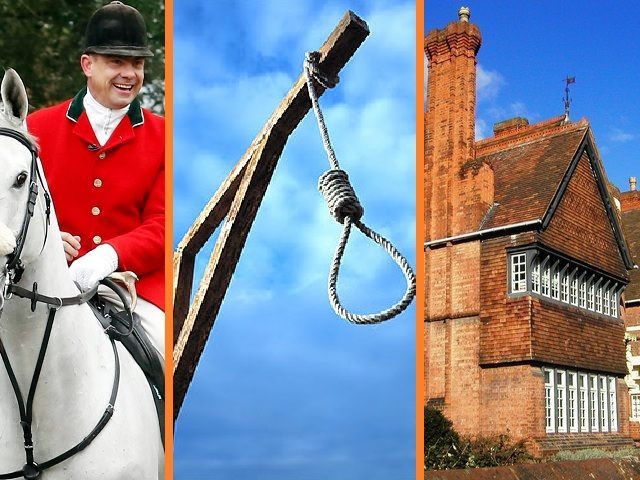Unencumbered by the constraints of coalition, the Conservatives now have an opportunity and mandate to follow through on their election manifesto pledges, and a bunch more besides.
From bringing back hanging to abolishing the BBC, here is the Breitbart London top five…
1. EU Referendum
 Although victor Call me Dave remains an unapologetic Europhile, the Tory victory at least means there will be a referendum on the UK’s membership of the European Union in 2017, giving Eurosceptic pressure groups and UKIP two years to lay groundwork and make solid the case for Brexit.
Although victor Call me Dave remains an unapologetic Europhile, the Tory victory at least means there will be a referendum on the UK’s membership of the European Union in 2017, giving Eurosceptic pressure groups and UKIP two years to lay groundwork and make solid the case for Brexit.
The advantages of both trade and freedom for Britain outside of the EU are manifest. Luke Stanley of campaign group Get Britain Out remarked to us: “Unconstrained by EU membership, an independent Britain could negotiate lucrative free trade agreements with our cultural allies across the Anglosphere, from the United States and Canada in the West to Australia, India and Hong Kong in the East.
“Once we vote to Get Britain Out of the EU, the British public embrace globalisation instead of shying away from it. If we do so, the world will truly be Britain’s oyster”.
Despite the reluctance of Cameron to advocate Brexit, we can be cheered by the number of Eurosceptic Conservative MPs who are now in parliament who can, by taking advantage of the ultra-slim Conservative majority, hold Cameron to account if and when necessary.
2. Bringing Back Hanging
 Not one from the Conservative manifesto, but that hasn’t stopped the left-wing press (and the increasingly wet Telegraph) from becoming extremely animated about the appointment of Michael Gove to Justice Secretary because of his formerly robust views on capital punishment.
Not one from the Conservative manifesto, but that hasn’t stopped the left-wing press (and the increasingly wet Telegraph) from becoming extremely animated about the appointment of Michael Gove to Justice Secretary because of his formerly robust views on capital punishment.
Gove, once a Times journalist, called for the return of hanging as a punishment for capital crimes in a 1998 column, remarking that abolishing hanging had “led to a corruption of our criminal justice system, the erosion of all our freedoms and has made the punishment of the innocent more likely”.
“Hanging may seem barbarous, but the greater barbarity lies in the slow abandonment of our common law traditions. Were I ever alone in the dock I would not want to be arraigned before our flawed tribunals, knowing my freedom could be forfeit as a result of political pressures. I would prefer a fair trial, under the shadow of the noose”.
Hanging was banned for all but a small number of crimes, including piracy and mutiny, by the Labour government in 1965, with just one gallows maintained in a London prison until the 1990s. British public opinion was against the ban in the 1960s, and remained in favour of bringing back the death penalty until very recently. As Breitbart London reported in March, as recently as 1993 support for the death penalty was 74 per cent.
It dipped below 50 per cent, probably for the first time in British history this year.
Although, those who would like to see hanging brought back for crimes like murder and terrorism can take heart at the latest figures – when ‘not sure’ respondents to the annual British Social Attitudes Survey are stripped out, those actively in favour of bringing back the noose far outweigh those who want to keep it banned. Michael Gove, Justice Secretary, take note.
3. End the Foxhunting Ban
 Back in March, Cameron wrote a fluffy piece for the newsletter of the Countryside Alliance, replete with pictures of him cuddling newborn piglets and lambs, in which he promised to take action on the voting ban, brought in by Labour against massive resistance from the rural community in 2004. The Prime Minister said: “There is definitely a rural way of life which a born and bred Londoner might struggle to understand.
Back in March, Cameron wrote a fluffy piece for the newsletter of the Countryside Alliance, replete with pictures of him cuddling newborn piglets and lambs, in which he promised to take action on the voting ban, brought in by Labour against massive resistance from the rural community in 2004. The Prime Minister said: “There is definitely a rural way of life which a born and bred Londoner might struggle to understand.
“I have always been a strong supporter of country sports. It is my firm belief that people should have the freedom to hunt, so I share the frustration that many people feel about the Hunting Act and the way it was brought in by the last government. The Hunting Act has done nothing for animal welfare.
“A Conservative Government will give Parliament the opportunity to repeal the Hunting Act on a free vote, with a government Bill in government time”.
Noble words, but how likely is the vote to pass? With a majority of ten, any backbench rebellion could defeat the motion, and set back the case for repeal by years. Disconcertingly, The Independent reports up to two dozen members of parliament have signed up to internal pressure group Conservatives Against Fox Hunting, which even with support from the DUP may make the vote impossible to pass.
Is it possible the Conservative party is already too far gone, too metropolitan to even perform the simple repeal of this astonishingly illiberal legislation?
4. Abolishing the BBC
 As the Breitbart headline has it today, Cameron has already declared war on the BBC by appointing John Whittingdale as Culture Secretary. A long standing critic of the BBC, Whittingdale has previously compared the licence fee to the poll tax and has called it “unsustainable”. Speaking last year, he said of the licence fee: “It’s actually worse than a poll tax because under the poll tax, if you were on a very low income you would get a considerable subsidy. The BBC licence fee, there is no means-tested element whatsoever; it doesn’t matter how poor you are, you pay £145.50 and go to prison if you don’t pay it.”
As the Breitbart headline has it today, Cameron has already declared war on the BBC by appointing John Whittingdale as Culture Secretary. A long standing critic of the BBC, Whittingdale has previously compared the licence fee to the poll tax and has called it “unsustainable”. Speaking last year, he said of the licence fee: “It’s actually worse than a poll tax because under the poll tax, if you were on a very low income you would get a considerable subsidy. The BBC licence fee, there is no means-tested element whatsoever; it doesn’t matter how poor you are, you pay £145.50 and go to prison if you don’t pay it.”
It is possible, therefore Whittingdale will go even further than the pledge in the Conservative manifesto to merely freeze the licence fee while delivering “a comprehensive review of the BBC Royal Charter, ensuring it delivers value for money for the licence fee payer, while maintaining a world class service and supporting our creative industries”.
With the renegotiation of the BBC Royal Charter coming next year, this is a golden opportunity to abolish the biased BBC trust and rebuild the corporation from the ground up. As Whittingdale has already said: “The trust has failed to meet expectations and should be abolished. It remains far too close to the BBC and blurs accountability rather than it being a sharp and effective overseer of the BBC’s performance as a public service institution … An organisation of the size and cost of the BBC must be subject to the most rigorous independent scrutiny”.
The BBC itself is already moving to defend itself from this most sceptical of cabinet ministers. As Guido Fawkes kindly points out, within minutes of Whittingdale being appointed to Culture, the BBC press office tweeted about his record of voting against gay marriage, and against the hunting ban.
The tweet was quickly deleted.
5. Bringing Back Grammar Schools
 Straight out of the Guardian bumper omnibus of horror stories for young socialists, the return of the greatest single engine for social mobility and fairness in the history of Britain is surely enough to send a shiver down the spine of any right-thinking member of the North London elite. The return of grammar schools isn’t even on the agenda as far as the Tory manifesto goes, yet that hasn’t stopped The Guardian expressing concern that it’s right around the corner, hot on the heels of Gove’s magnificent stab at educational reform.
Straight out of the Guardian bumper omnibus of horror stories for young socialists, the return of the greatest single engine for social mobility and fairness in the history of Britain is surely enough to send a shiver down the spine of any right-thinking member of the North London elite. The return of grammar schools isn’t even on the agenda as far as the Tory manifesto goes, yet that hasn’t stopped The Guardian expressing concern that it’s right around the corner, hot on the heels of Gove’s magnificent stab at educational reform.
An article featuring in today’s Guardian education pages explains: “Plenty of Tory MPs would like to see an outright return to selection and can’t understand why parents can have a free school specialising in a particular curriculum, or catering to a minority faith group, but not a free school devoted only to the most able children.
“A straight return to the 11-plus nationwide would require primary legislation, but even that is not impossible. At least one candidate for the Tory succession, Boris Johnson, has backed a return to grammar schools.
“But more insidious in the short term is the fact that the unlimited expansion of any popular school, a coalition policy in the last parliament, means there is nothing to stop existing grammar schools bidding to open “annexes” (in effect new selective schools) locally”.
Allowing grammar schools to ‘expand’ was a feature of the Conservative manifesto – a concept that The Guardian columnist calls “chilling” and “horrifying”. Surely we can do even better than that, and restore to those many successful (and often ancient) grammar schools unceremoniously stripped of their special status in 1975, only a couple of decades after being forcibly brought under the government’s purview against their will, the ability to teach traditionally again.
Concluding…
This shopping list of policies depends in whole on David Cameron keeping his word, and his nerve over the next five years. We can surely trust him to do that much at least..?

COMMENTS
Please let us know if you're having issues with commenting.